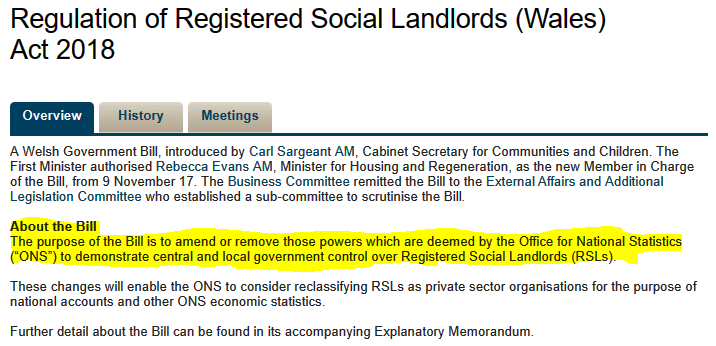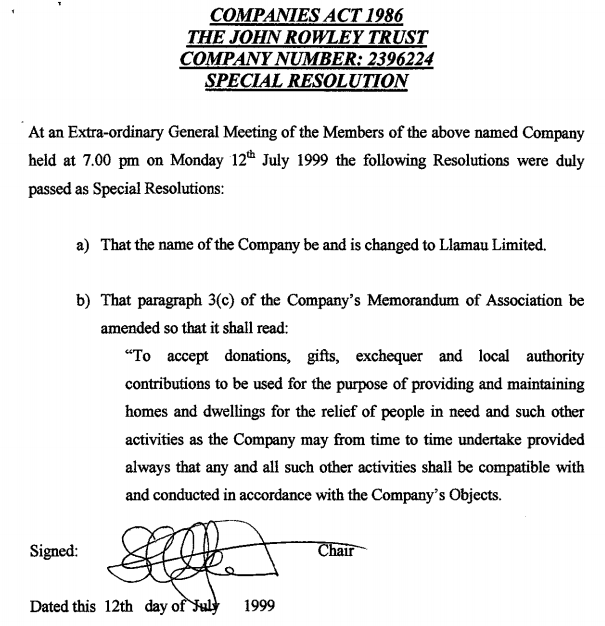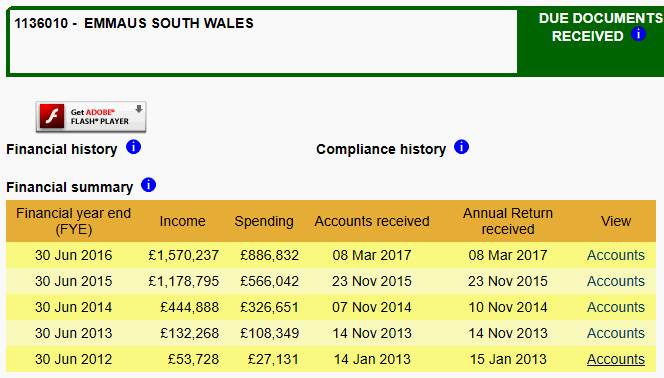THE GREAT MYSTERY OF HOUSING ASSOCIATIONS
I have written about housing associations dozens of times. One of the many things that intrigued me was their legal status – were they public bodies or private companies? For on the one hand they enjoyed the benefit of public funding (and lots of it), yet were exempt from public scrutiny and Freedom of Information legislation, just like private companies.
From my inquiries into housing associations I concluded that they enjoyed the best of both worlds.
But this idyll was threatened in late 2015 when the Office for National Statistics surprised us all by deciding that – by falling into line with EU accounting rules – Registered Social Landlords (the more official name for housing associations) in England should be reclassified from Private Non-Financial Corporations to Public Non-Financial Corporations. (Wales and Scotland would also be affected.)
This certainly surprised me, and the revelation that housing associations were regarded as private companies also surprised those who had innocently assumed that publicly-funded providers of social housing, owning for the most part stock they had inherited from local authorities, were already public bodies.

In addition to surprising some, the change also annoyed a number of people, not least the man in No 11 Downing Street, because it meant that £60bn of housing association debt would be added to the UK’s public indebtedness. Within the sector there were concerns that reclassification would mean, among other things, that housing associations would now be open to public scrutiny.
But if nothing else, this move by the ONS clarified the status of these mysterious bodies. They had been private, the ONS wanted to make them public, and now the race was on to find a way of reversing the ONS decision.
England led the way and in November 2017 the ONS announced that once the new measures had passed into law housing associations would be reclassified once again as private bodies. Wales followed suit in June this year with the Regulation of Registered Social Landlords (Wales) Act 2018. Despite the title, the purpose of this legislation is in fact to deregulate housing associations so that there is no possibility of them being considered public bodies.
◊
ALL CHANGE
Before delving into the Act, let me make a few things clear. It would be easy to think that if housing associations were private bodies that were briefly deemed to be public bodies by the ONS and are now reclassified as private, then surely we’re back where we started? Er, no . . . there have been many changes, significant and worrying changes.
These are encapsulated in ‘About the Bill’ in the ‘Overview’ introduction to the legislation, where it says:

It tells us clearly that to satisfy the Office for National Statistics “The purpose of the Bill is to amend or remove those powers which are deemed by the Office for National Statistics (“ONS”) to demonstrate central and local government control over Registered Social Landlords (RSLs).”
For those who find it difficult to wade through the full legislation (which I guess is some 99% of us) here’s a more manageable ‘Guide’ in which I’ve highlighted certain sections that I shall now focus on in order to discuss what I consider to be a very worrying direction of travel.
Let’s turn to the highlighted document.
Paragraphs 13, 15, 18 and 20 all list circumstances or situations in which housing associations no longer need the consent of ‘Welsh Ministers’. This is not a reference to a conclave of Nonconformist preachers but to the clowns down Cardiff docks who want us to think of them as the ‘Welsh Government’. (In reality they are just England’s management team in Wales.)
In practice, it means that a Registered Social Landlord in Wales is now free to make any change it likes to its rules, merge with another company, transfer its “engagements” (assets?) to another company, or go into liquidation, all without needing the approval of the ‘Welsh Ministers’.
Paragraphs 33 and 34 however gives the ‘Welsh Ministers’ power to both remove and appoint officers of RSLs, even if that housing association is a company. Which strikes me as a little odd, and would appear to contradict the expressed objective of removing the powers of local and central government.
As do paragraphs 40, 42 and 43 which also give or retain powers for the ‘Welsh Ministers’. These include the right to compel a RSL “to transfer management functions to a person specified by them (the ‘Welsh Ministers’)”. They can also appoint a manager and forcibly amalgamate RSLs.
Further paragraphs are in the same vein until we come to 61, which is worth thinking about, for it gives the ‘Welsh Ministers’ the power to show favouritism to certain housing associations at the expense of others.
Paragraph 63 suggests that housing associations are now free to hide “disposal proceeds” in the accounts, proceeds that will almost certainly have been paid for out of public funds. What’s more, ‘Welsh Ministers’ have no say in how the money – public money – is to be used.

Paragraphs 64, 71, 73 and 78 reiterate that local authorities – that is, the democratically elected bodies serving the areas in which housing associations operate – no longer have any influence in the running of RSLs.
◊
WHAT WILL IT MEAN IN PRACTICE?
In a nutshell, Serendipity presented the ‘Welsh’ Government with an opportunity to extend its power in areas where the Labour Party is as popular as Boris Johnson at a Remoaner Wail-in and Carwyn and his gang grabbed the chance with both hands.
Or to look at it from another angle, an allegedly socialist political party has no qualms about privatising bodies holding and managing public assets.
Let’s deal with the power grab first. Despite being the party with the most MPs and AMs, and the party of power in Cardiff docks, Labour controls just twelve of Wales’ twenty-two local authorities. And none in the south west, the north west or the centre.
As I’ve explained on this blog a number of times, Labour overcomes its lack of representation – and consequently influence – through the power of patronage and funding. The third sector being a prime example, controlled via public funding dished out by the Labour management team in Cardiff docks the third sector is stuffed with Labour’s cronies and operates across the country. Whether it’s the Citizens Advice Bureau in Gwynedd or one of the countless ‘homelessness’ charities fighting over rough sleepers Labour uses the third sector to give it influence in areas where it has little electoral support.
The same can be said of housing associations. There are certain RSLs aligned with Labour and these are rewarded with extra funding and encouragement to take over housing associations that are not run by Labour Party supporters. One example I’ve dealt with a number of times was the takeover of Cantref, based in Castell Newydd Emlyn, by Wales and West Housing of Cardiff, run by the wife of a Cardiff Labour councillor. (A woman who insists on appearing in almost every photograph.)
One curb on the excesses of such Labour shenanigans was the involvement of local, non-Labour councillors, in the running of housing associations operating on their patch. But as we’ve seen, the new Act removes that involvement.

But the Act entrenches the power of the ‘Welsh’ Government to interfere of behalf of Labour-connected RSLs. For example, it’s no secret that Wales and West wants to take over Tai Ceredigion. The minister responsible could remove Tai Ceredigion’s CEO, replace him with a Labour stooge, who could then announce that the best option for Tai Ceredigion would be a merger with Wales and West Housing.
I’ve focused on Wales and West but I could have mentioned any number of other housing associations that are obviously Labour in their political orientation but tend to operate in one area, unlike Wales and West, which has a national reach, active in 15 of our 22 local authority areas.
◊
GYPSY JAC GAZES INTO HIS CRYSTAL BALL
With housing associations deregulated, local authority influence removed, and the Labour Party able to control the whole shooting match, Wales could be facing a bleak future.
Let’s take Gwynedd, an area where Labour’s support is largely limited to academics and students around the alien university in Bangor. In the near future Cartrefi Cymunedol Gwynedd (which inherited Gwynedd’s social housing stock) could be taken over by Labour Party appointees, who then sign contracts with English local authorities and RSLs to help them bring down their waiting lists for social housing. Something the new legislation allows RSLs to do.
So Cartrefi Cymunedol Gwynedd goes on a building spree with borrowed money.
But it eventually becomes clear that Cartrefi Cymunedol Gwynedd has bitten off more than it can chew and it goes into voluntary liquidation owing millions of pounds to lenders. So who is now responsible for that debt? Is it the ‘Welsh’ Government – in other words, you and me?
One of the objections to the reclassification as public bodies was that such a move would restrict housing associations’ ability to borrow money. Though Welsh RSLs have in the past borrowed very little from commercial lenders – that wasn’t repaid by the ‘Welsh’ Government – because they don’t need to. They have the guaranteed income from their housing stock, a stock that in most cases was paid for out of public funds, and as we know, this income is supplemented by handouts from the ‘Welsh’ Government.
So what becomes of these handouts now? Will deregulated private housing associations still receive public funding every year?

Another consideration might be that Welsh RSLs are also free to enter into agreements with those London boroughs currently engaged in social cleansing. Which could mean that a Welsh RSL in receipt of your money would be helping move people from London to Wales.
The new Act also allows RSLs to dispose of their ‘engagements’ and land assets. So what redress is there if, for example, Mid Wales Housing sells off land or property to RSLs based in the English West Midlands and these bodies then move many of their less ‘sociable’ tenants into places like Meifod and Llanwrtyd?
Clearly, the temptation is now there for Welsh RSLs to borrow unwisely and to over-extend themselves, which may well serve a certain agenda.
I say that because most people agree that we have too many housing associations. There are ten operating in Neath Port Talbot, six in Conwy, and no less than fifteen in Cardiff.
Obviously, the total number must be reduced, and the new Act makes it easier to undermine RSLs not favoured by Labour – as was done with Cantref – and to force through mergers. Which is what I predict will happen in the coming years, and it will be justified in the name of ‘rationalisation’.
What will be glossed over is the fact that the only housing associations left standing at the end of this process will be those run by Labour Party members and supporters. For make no mistake, the Regulation of Registered Social Landlords (Wales) Act 2018 gives the Labour Party more opportunities to extend its malign influence through giving its hangers-on preferential treatment.
But this is how a one-party state operates – supporters are rewarded and non-supporters compromised or intimidated.
◊
LABOUR’S NUCLEAR OPTION
But the starkest and most dangerous reminder of the one-party state could, paradoxically, come when most people think the power of the Labour Party in Wales has finally been broken. A case of the cornered beast.
I can see a situation, maybe as early as the Assembly elections of 2021, that sees Labour without a majority and unable to cobble together a coalition. The ‘Welsh’ Labour Party will then be in opposition down Cardiff docks.
It is at this point that all the scheming and placements, all the bribes and sinecures, bear fruit, and all the favours will be called in. For it will be when Labour is in opposition that we see the benefit of having a bloated third sector, of filling housing associations with its people, of generally building up a network of supporters and funding recipients, everyone from Mrs Tiggy-Winkle’s Hedgehog Rescue Service to Côr Meibion Cwmscwt.
For I predict with absolute certainty that when Labour loses control of the Assembly it will not accept defeat gracefully. The party will begin a campaign of guerilla warfare to undermine the new administration. Wrecking Wales will be acceptable collateral damage, because the party comes first.
Labour’s foot-soldiers in this dirty war will be its supporters in the sectors and networks the party has carefully built up over the past twenty years, including the deregulated RSLs, and these will be backed by a media that is either Labour-leaning or else a BritNat propaganda outlet for which Labour – as a Unionist party – is far more acceptable than what may have replaced Labour.
Making it easier for Wales to be made ungovernable through vindictive factionalism could be an important consequence of the Regulation of Registered Social Landlords (Wales) Act 2018.
♦ end ♦





























































